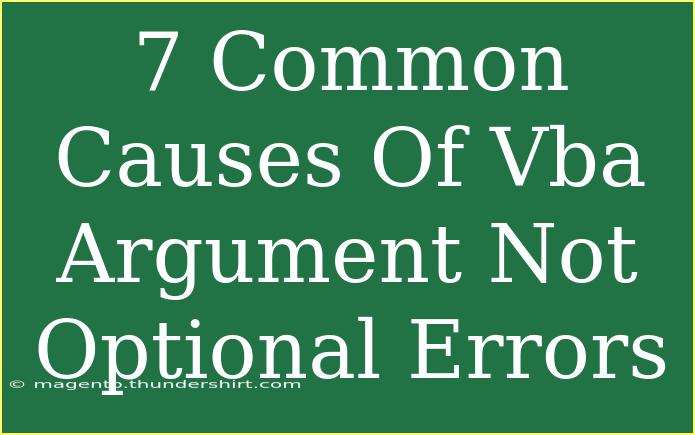When working with VBA (Visual Basic for Applications), you might occasionally stumble across an error message that can throw a wrench in your coding plans: "Argument not optional." 😤 This error can be quite frustrating, especially when you’re knee-deep in a project and simply trying to get your macros to run smoothly. In this guide, we’ll dive into the common causes of this error, share troubleshooting tips, and offer advice on how to avoid these pitfalls in the future.
Understanding the "Argument Not Optional" Error
Before we jump into the common causes of this error, let’s clarify what it means. Essentially, the "Argument not optional" message indicates that a required parameter for a function or subroutine was not provided. In simpler terms, you’ve likely missed giving your function the necessary information it needs to perform its task. 🛠️
To get your coding back on track, here’s a list of the most common causes of the "Argument not optional" error, along with explanations and advice on how to fix them.
Common Causes of the "Argument Not Optional" Error
1. Missing Arguments in Function Calls
When you call a function that requires parameters, make sure you provide all necessary arguments. For example:
Function CalculateTotal(price As Double, tax As Double) As Double
CalculateTotal = price + (price * tax)
End Function
If you call CalculateTotal(100) instead of CalculateTotal(100, 0.05), you’ll trigger the "Argument not optional" error because the tax parameter is missing.
2. Incorrect Number of Arguments
Another common issue is passing the wrong number of arguments. If a function expects three arguments and you give it four or only two, you’ll run into this error. Always double-check the function’s definition to see how many parameters it needs.
3. Optional Parameters Not Properly Defined
If you define an argument as optional, ensure it has a default value. If an optional parameter doesn’t have a default and is not supplied in the call, it will cause the error. You can define optional parameters using the Optional keyword.
Example:
Function Greet(Optional name As String = "Guest") As String
Greet = "Hello, " & name
End Function
Here, name is optional, and it defaults to "Guest" if not provided.
4. Using Function Results Incorrectly
If you try to use the result of a function in a way that requires more arguments than the function provides, it will lead to this error. For instance:
Dim result As Double
result = CalculateTotal(100) ' This will cause an error if CalculateTotal needs two parameters.
5. Confusing Subroutines and Functions
VBA distinguishes between functions and subroutines. Functions return a value and require proper arguments to do so, while subroutines (defined with the Sub keyword) do not return values. If you mistakenly use them interchangeably, you might end up encountering the "Argument not optional" error.
Sub ShowMessage(message As String)
MsgBox message
End Sub
Calling ShowMessage() without an argument will cause an error.
6. Misleading Error Message
Sometimes, a misleading error message might point to another issue in the code. You may be getting the "Argument not optional" error, but it could stem from a variable not being declared or from another function called within the same scope. Ensure all your variables are properly defined and that any called functions are correctly implemented.
7. Library References Missing or Incorrect
If you're using functions from external libraries (like Excel functions through VBA), ensure that the references to those libraries are set correctly. If they’re not, the VBA environment may not recognize the functions or their arguments, leading to confusion and the "Argument not optional" error.
Tips for Troubleshooting and Avoiding the Error
- Double-check your function definitions to ensure you are using the correct number of parameters.
- Use
Optional parameters wisely and remember to provide default values where necessary.
- Read the error message carefully. It may be pointing to a deeper issue in your code.
- Test functions in isolation. Isolate the function causing the problem to troubleshoot without other complexities involved.
- Seek help in communities. Don’t hesitate to reach out to forums or fellow coders for assistance when stuck.
Examples of Using Functions Correctly
Here’s how you can set up your functions properly:
Function AverageScore(score1 As Double, score2 As Double, Optional score3 As Double = 0) As Double
AverageScore = (score1 + score2 + score3) / 2
End Function
Sub TestAverage()
Dim result As Double
result = AverageScore(85, 90) ' This is fine
MsgBox "Average Score is: " & result
End Sub
In the example above, the score3 parameter is optional and defaults to zero if not provided. This avoids the "Argument not optional" error entirely.
<div class="faq-section">
<div class="faq-container">
<h2>Frequently Asked Questions</h2>
<div class="faq-item">
<div class="faq-question">
<h3>What does the "Argument not optional" error mean in VBA?</h3>
<span class="faq-toggle">+</span>
</div>
<div class="faq-answer">
<p>This error occurs when a function or subroutine is called without supplying all the required parameters.</p>
</div>
</div>
<div class="faq-item">
<div class="faq-question">
<h3>How can I define optional parameters in VBA?</h3>
<span class="faq-toggle">+</span>
</div>
<div class="faq-answer">
<p>You can define optional parameters by using the 'Optional' keyword and providing a default value if desired.</p>
</div>
</div>
<div class="faq-item">
<div class="faq-question">
<h3>Can I use functions and subroutines interchangeably?</h3>
<span class="faq-toggle">+</span>
</div>
<div class="faq-answer">
<p>No, functions return values and require proper arguments. Subroutines do not return values.</p>
</div>
</div>
<div class="faq-item">
<div class="faq-question">
<h3>What should I do if I'm confused by the error message?</h3>
<span class="faq-toggle">+</span>
</div>
<div class="faq-answer">
<p>Double-check your code for any missing arguments or improperly defined functions and subroutines.</p>
</div>
</div>
</div>
</div>
Recapping the key takeaways from this guide, it’s essential to always check your function definitions, ensure proper argument passing, and utilize optional parameters wisely. Understanding these nuances can save you a lot of time and headaches while coding in VBA. So, the next time you encounter the "Argument not optional" error, you’ll be armed with the knowledge to tackle it head-on! 🌟
<p class="pro-note">💡Pro Tip: Always read the function documentation or comments to verify required parameters before invoking any function!</p>
